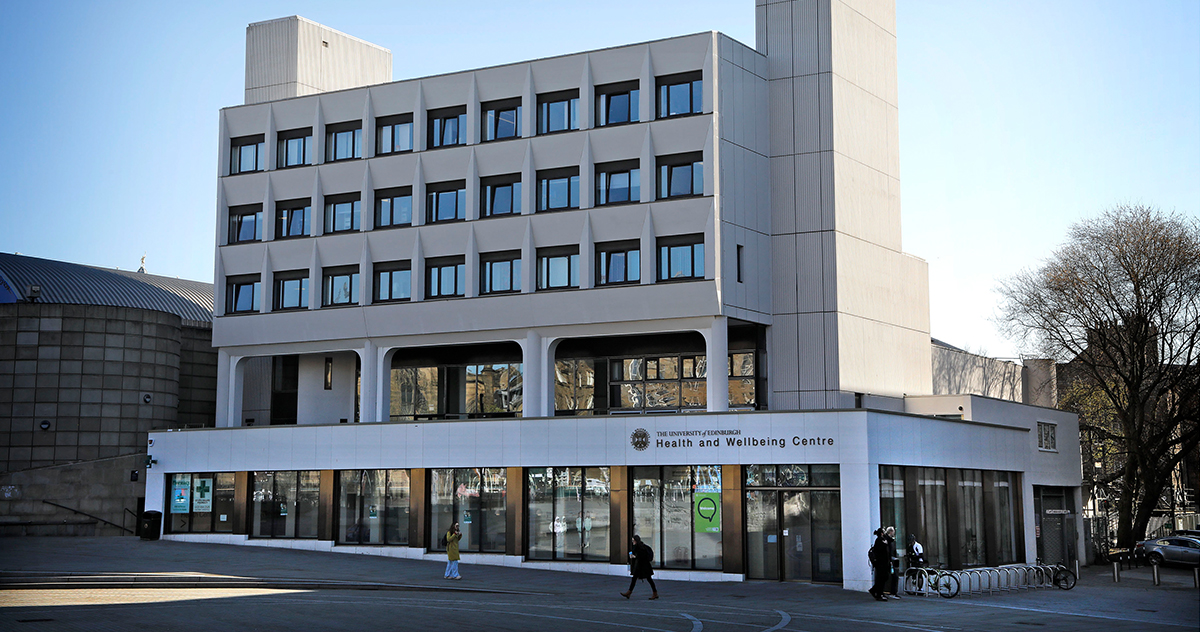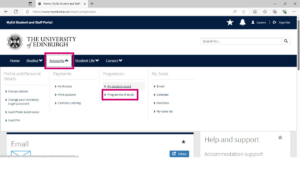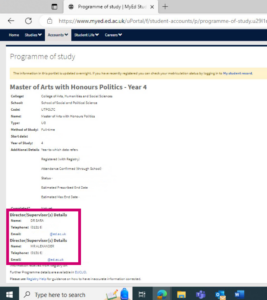How to access disability, learning and health support at university

By Lauren, from Scotland, studying Politics
Coming to university is already daunting enough, and this can become even more scary if you have a disability, health condition or learning support need. When I came to university, trying to find and access support for myself was a major priority, but I had no idea where to start looking for the right support. With the benefit of hindsight on my side, here is a guide on how to access support at university.
Register with a GP
One of the most important steps you can take is registering with a doctor when you move to Edinburgh. Doctors are known as GPs (General Practitioners) in the UK ad registering allows you to access National Health Service (NHS) services, support, and resources such as counselling, medication, and specialised services.
Before you come to university, research the GP practices in your area by checking out the NHS Scotland Inform website, which has a database you can filter by location by inputting your postcode.
I would recommend making a list of around five practices in your area and finding out when you need to apply to them. Different GP practices often have different registration processes, so research and fill out any forms they may have on their website. Also, while the University has a GP in Bristo Square, only certain areas and accommodation can register with it, so make sure you check before you apply.
It’s also a good idea to bring a supply of any medication you are taking to ensure you don’t run out before you have registered with a GP.
Learn more about registering with a GP
Schedule an appointment
Once you have registered with a GP, make sure you book an appointment to talk through what support you require. Although some GPs will automatically receive your information when you transfer to GP services in Edinburgh from elsewhere in Scotland or the UK, it’s a great idea to book an appointment to make sure that support is in place for you. When I moved to the city, the GP had received my files already, but I also had a physical copy of them just in case anything got lost!
If you are an international student moving to Edinburgh it is very important to bring a comprehensive and up-to-date summary of your medical record with you and any proposed management plan (all written in English).
How the University can support you
While NHS services can help you access general and specialised support, prescriptions, and long-term or ongoing support, the University also has some resources that you can access in addition to NHS support.
Disability and Learning Support service
A service I wish I had known about sooner was the Disability and Learning Support service. Although I knew I was struggling a lot with my mental health at the time of coming to Edinburgh, I didn’t think that the service was for me, as I did not have a physical disability or a specific learning difference. After speaking to my student adviser and GP, however, I learnt that the service is also available for people who have mental health conditions that may impact their studies.
Within my first few weeks, I had scheduled an appointment with the service. They were able to help me with a schedule of adjustments and referred me for the Disability Students Allowance. This allowed me to apply for funding for assistive technology such as microphones and software for my laptop, to help me adjust to university life!
The service operates throughout the year and can help anyone with a range of health and neurodiverse conditions, learning differences, disabilities and some temporary injuries. I would recommend getting in contact with them as soon as possible, as sometimes referrals to different services and support can take a while. It is also important to note that they will need some supporting documentation. You can check out what they may need from you on their website.
View Disability and Learning Support Service information
Student Adviser
If you are struggling with your academic studies and need support, you can talk to your Student Adviser, who can refer you to specialised support, such as the wellbeing team.

All undergraduate and postgraduate taught students have access to a student adviser. You can find their contact details on MyEd under Accounts, and then Programme of Study.


Learn about ways your Student Adviser can support you
Student Counselling Service
The Student Counselling Service is another great resource to keep in mind for short-term support. The service offers courses of counselling sessions to students, and you can self-refer via their website.
While it does not replace long-term or NHS support, the student counselling service is a great resource if you are going through a difficult time and need someone to chat with. They offer same-day appointments and award-winning Skills for Study workshops and can also help you access specialised support and services.
Explore the scope of care provided by the Student Counselling Service
Student Wellbeing Service
The Student Wellbeing Service act as a hub for a whole range of resources, and work with student support and advisers to provide proactive and reactive wellbeing support for all students.
If you would like to access the service, you can self-refer or contact your student adviser to refer you. If you would prefer a 20-minute drop-in appointment, you can book it online via the Student Wellbeing Service website.
View Student Wellbeing Service website
Chaplaincy
Throughout my first year, I thought the Chaplaincy was only for people who were religious. However, I have recently discovered that it is open to all students! The service offers a bunch of great resources, such as their Listening service, where you can go along and chat with someone about stuff that you may be stressed or worried about, such as your coursework, life transitions, or your mental health.
View information on accessing the Listening Service

The Chaplaincy also has support groups and drop-in sessions for displaced students who may be affected by war or disaster in their home country. They hold support drives, vigils and services for those affected, and often partner with student groups to help reach different communities within the University.
Explore the Chaplaincy’s other resources
The Advice Place
Another service that I would recommend getting in touch with is the Advice Place in Potterrow or Kings Building. They offer online or in-person appointments to help you throughout your time at university, with topics such as accommodation, harassment, and academic worries such as applying for special circumstances or extensions. While the service cannot directly help you with topics such as Immigration, mental health support, or providing accommodation, they can act as a sounding board and help advise you on next steps and specialised support.
Support groups
The one thing I wish I knew when waiting for specialised services was that there are so many support groups in and around Edinburgh that can help you talk through your struggles with other people. A great resource to help you find these groups is the iThrive website, which is a database of all the support services in Edinburgh, and how to access them. All you need to do is input what you need support with, and the website finds local groups and resources.
Charities
A lot of mental health and disability charities in the UK also offer support on their website, which can help you access support online or in some cases, in person. Groups like Samaritans have a 24-hour helpline which you can phone up to chat to someone if you are in crisis.
Edinburgh Nightline offers a similar service. It is a confidential and non-judgemental support and information service, run by students, for students. They are open from 8 pm till 8 am every night of term, from Saturday to Wednesday.
Dealing with waitlists
Something that I did not expect when coming to Edinburgh and trying to access support was the waitlists. Without a doubt, this is frustrating – especially if you are dealing with something that affects your day-to-day life – as it can feel like you are floating in an unsupported void with no end in sight. But I am here to tell you that there is support out there for you and that you’re not alone in this – even if it can feel like it at times.
Reach out and talk
My overall advice on accessing and getting support while at university is to reach out and talk. Coming to university can be a really scary process that involves a lot of changes. Luckily Edinburgh is a city where there are a lot of supportive people and services.
From experience, reaching out for support and putting in place a support network can be challenging to begin with, but it is so, so worth it in the long run. Reach out, talk to your support network, your friends, or your family, and take everything one day at a time.



